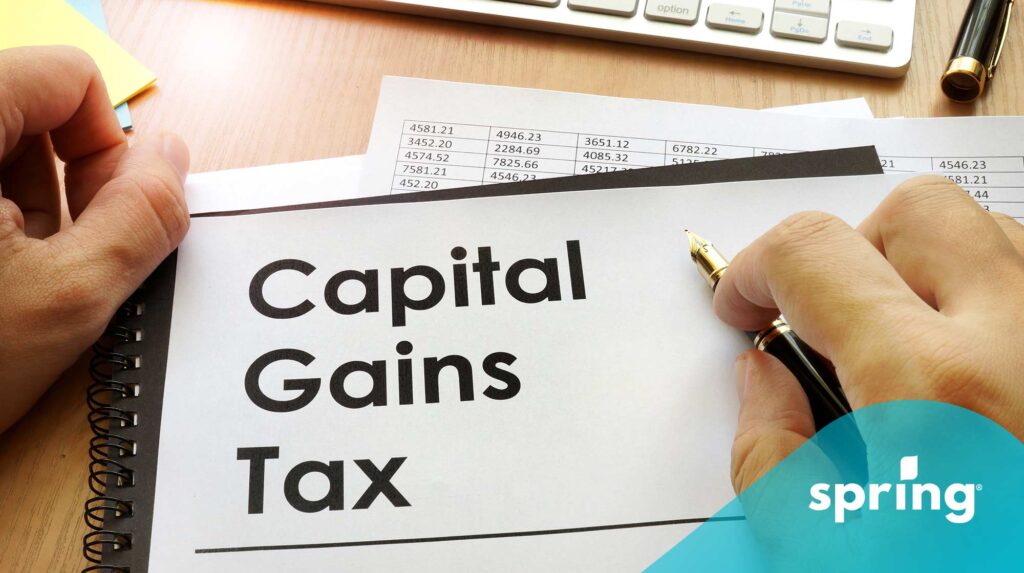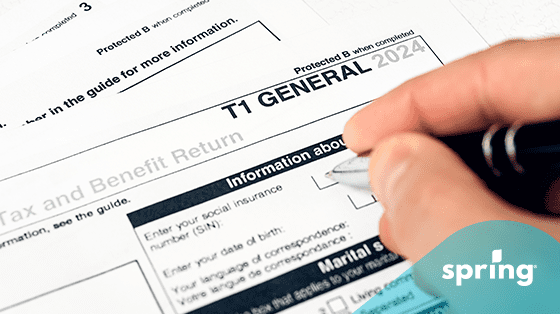Capital gains come from all sorts of assets, including stocks, bonds and properties.
Once you’ve sold an asset and received capital gains, you will have to claim it on your annual income tax return for tax fairness. You will then have to pay taxes on the funds you received from that sale. That said, you don’t have to pay the full amount you received. With capital gains tax, you only pay tax on 50% of the profits you earn. The profits are whatever you earned from the sale (proceeds of disposition) minus the original amount you paid.
How Capital Gains Work
Capital gains are profits on capital assets such as properties and investments. You can be charged capital gains tax in relation to business income or personal income. No matter who you are, you have to pay capital gains unless you qualify for some of the exemptions. These capital gains taxes are then paid to the Canada Revenue Agency (CRA). You can only claim realized capital gains, though, not unrealized capital gains.
Alternatively, there are capital losses as well as capital gains. Capital losses are when you sell the capital asset for less than the original price, even if it’s considered to be fair market value. You can also claim business investment losses as capital loss. Just like capital gains, these can be claimed on your annual tax return and offset capital gains that you have. However, if your capital losses exceed the amount of your capital gains, you can carry the remaining amounts to previous years, specifically any one of the last 3.
Just like every tax rule in Canada, there are some exceptions. One of these exceptions is that timber resource property is exempt from capital gains. Depending on your specific tax situation, Canadian resource property can also be taxed at 100% instead of the set inclusion rate. When it comes to other corporations, if that corporation’s resident country is Canada, then they’re taxed the same. If the corporation’s resident country isn’t Canada, it can still be taxed the same if it’s run in Canada under Canadian common law.
Capital Gains Tax Breakdown
As we mentioned above, you pay tax on 50% of your capital gains. That said, the amount you pay in tax will be different for everyone. Capital gains taxes are based on your personal tax rates and the tax bracket you fall into. The amount you’re being taxed on is added to your total taxable income, and you’ll be taxed at the marginal tax rate based on that total taxable income. Let’s take a look at the federal tax rates in Canada.
| Taxable Income Amounts | Marginal Tax Rate |
| On the portion of the income from $0 – $57,375 | 14.5% |
| On the portion of income, that’s $57,375 – $114,750 | 20.5% |
| On the portion of income that’s $114,750 – $177,882 | 26% |
| On the portion of income that’s $177,882 – $253,414 | 29% |
| On the portion of income, that’s $253,414 plus | 33% |
It’s important to remember that these tax rates are based on your gross annual income (pre-tax), not your net annual income (after tax).
Tax Per Province
Above, we went over the federal tax rate for capital gains. Just like with your employment income, you’ll need to pay provincial tax on capital gains as well. The rates will change based on the province or territory that you live in since you need to pay combined federal and provincial taxes. The final amount that you pay is based on the taxpayer’s income (your total taxable income).
British Columbia
| Taxable Income | First 250K | Over 250K | Other Income |
| $0 to $49,279 | 10.03% | 13.37% | 20.06% |
| $49,279 to $57,375 | 11.35% | 15.13% | 22.70% |
| $57,375 to $98,560 | 14.10% | 18.80% | 28.20% |
| $98,560 to $113,148 | 15.50% | 20.67% | 31.00% |
| $113,148 to $114,750 | 16.40% | 21.86% | 32.79% |
| $114,750 to $137,407 | 19.15% | 25.53% | 38.29% |
| $137,407 to $177,882 | 20.35% | 27.13% | 40.70% |
| $177,882 to $186,306 | 22.01% | 29.35% | 44.02% |
| $186,306 to $253,414 | 23.06% | 30.75% | 46.12% |
| $253,414 to $259,829 | 24.90% | 33.20% | 49.80% |
| Over $259,829 | 26.75% | 35.67% | 53.50% |
Alberta
| Taxable Income | First 250K | Over 250K | Other Income |
| $0 to $57,375 | 12.50% | 16.67% | 25.00% |
| $57,375 up to $114,750 | 15.25% | 20.33% | 30.50% |
| $114,750 up to $151,234 | 18.00% | 24.00% | 36.00% |
| $151,234 up to $177,882 | 19.00% | 25.33% | 38.00% |
| $177,882 up to $181,481 | 20.66% | 27.55% | 41.32% |
| $181,481 up to $241,974 | 21.16% | 28.21% | 42.32% |
| $241,974 up to $253,414 | 21.66% | 28.88% | 43.32% |
| $253,414 up to $362,961 | 23.50% | 31.33% | 47.00% |
| over $362,961 | 24.00% | 32.00% | 48.00% |
Saskatchewan
| Taxable Income | First 250K | Over 250K | Other Income |
| $0 to $53,463 | 12.75% | 17.00% | 25.50% |
| $53,463 up to $57,375 | 13.75% | 18.33% | 18.33% |
| $57,375 up to $114,750 | 16.50% | 22.00% | 33.00% |
| $114,750 up to $152,750 | 19.25% | 19.25% | 38.50% |
| $152,750 up to $177,882 | 20.25% | 27.00% | 40.50% |
| $177,882 up to $253,414 | 21.91% | 29.21% | 43.82% |
| over $253,414 | 23.75% | 31.67% | 47.50% |
Manitoba
| Taxable Income | First 250K | Over 250K | Other Income |
| $0 to 47,564 | 12.90% | 17.20% | 25.80% |
| $47,564 up to $57,375 | 13.88% | 18.50% | 27.75% |
| $57,375 up to $101,200 | 16.63% | 22.17% | 33.25% |
| $101,200 up to $114,750 | 18.95% | 25.27% | 37.90% |
| $114,750 up to $177,882 | 21.70% | 28.93% | 43.40% |
| $177,882 up to $200,000 | 23.36% | 31.15% | 46.72% |
| $200,000 up to $253,414 | 23.79% | 31.72% | 47.58% |
| $253,414 up to $400,000 | 25.63% | 34.17% | 51.26% |
| over $400,000 | 25.63% | 34.17% | 51.26% |
Ontario
| Taxable Income | First 250K | Over 250K | Other Income |
| 0$ to $52,886 | 10.03% | 13.37% | 20.05% |
| $52,886 up to $57,375 | 12.08% | 16.10% | 24.15% |
| $57,375 up to $93,132 | 14.83% | 19.77% | 29.65% |
| $93,132 up to $105,775 | 15.74% | 20.99% | 31.48% |
| $105,775 up to $109,727 | 16.95% | 22.59% | 33.89% |
| $109,727 up to $114,750 | 18.95% | 25.27% | 37.91% |
| $114,750 up to $150,000 | 21.70% | 28.94% | 43.41% |
| $150,000 up to $177,882 | 22.48% | 29.98% | 44.97% |
| $177,882 up to $220,000 | 24.14% | 32.19% | 48.29% |
| $220,000 up to $253,414 | 24.92% | 33.23% | 49.85% |
| over $253,414 | 26.76% | 35.69% | 53.53% |
Prince Edward Island
| Taxable Income | First 250K | Over 250K | Other Income |
| $0 to $33,328 | 12.25% | 16.33% | 24.50% |
| $33,328 up to $57,375 | 14.24% | 18.98% | 28.47% |
| $57,375 up to $64,656 | 16.99% | 22.65% | 33.97% |
| $64,656 up to $105,000 | 18.55% | 24.73% | 37.10% |
| $105,000 up to $114,750 | 19.06% | 25.41% | 38.12% |
| $114,750 up to $140,000 | 21.81% | 29.08% | 43.62% |
| $140,000 up to $177,882 | 22.50% | 30.00% | 45.00% |
| $177,882 up to $253,414 | 24.16% | 32.21% | 48.32% |
| over $253,414 | 26.00% | 34.67% | 52.00% |
New Brunswick
| Taxable Income | First 250K | Over 250K | Other Income |
| $0 to $51,306 | 12.20% | 16.27% | 24.40% |
| $51,306 up to $57,375 | 14.50% | 19.33% | 29.00% |
| $57,375 up to $102,614 | 17.25% | 23.00% | 34.50% |
| $102,614 up to $114,750 | 18.25% | 24.33% | 36.50% |
| $114,750 up to $177,882 | 21.00% | 28.00% | 42.00% |
| $177,882 up to $190,060 | 22.66% | 30.21% | 45.32% |
| $190,060 up to $253,414 | 24.41% | 32.55% | 48.82% |
| over $253,414 | 26.25% | 35.00% | 52.50% |
Newfoundland and Labrador
| Taxable Income | First 250K | Over 250K | Other Income |
| $0 to $44,192 | 11.85% | 15.80% | 23.70% |
| $44,192 up to $57,375 | 14.75% | 19.67% | 29.50% |
| $57,375 up to $88,382 | 17.50% | 23.33% | 35.00% |
| $88,382 up to $114,750 | 18.15% | 24.20% | 36.30% |
| $114,750 up to $157,792 | 20.90% | 27.87% | 41.80% |
| $157,792 up to $177,882 | 21.90% | 29.20% | 43.80% |
| $177,882 up to $220,910 | 23.56% | 31.41% | 47.12% |
| $220,910 up to $253,414 | 24.56% | 32.75% | 49.12% |
| $253,414 up to $282,214 | 26.40% | 35.20% | 52.80% |
| $282,214 up to $564,429 | 26.90% | 35.87% | 53.80% |
| $564,429 up to $1,128,858 | 27.15% | 36.20% | 54.30% |
| over $1,128,858 | 27.40% | 36.53% | 54.80% |
Nova Scotia
| Taxable Income | First 250K | Over 250K | Other Income |
| $0 to $25,000 | 11.90% | 15.86% | 23.79% |
| $25,000 up to $30,507 | 12.16% | 16.21% | 24.32% |
| $30,507 up to $57,375 | 15.24% | 20.32% | 30.48% |
| $57,375 up to $61,015 | 17.99% | 23.99% | 35.98% |
| $61,015 up to $74,999 | 18.85% | 25.13% | 37.70% |
| $74,999 up to $95,883 | 18.59% | 24.78% | 37.17% |
| $95,883 up to $114,750 | 19.00% | 25.33% | 38.00% |
| $114,750 up to $154,650 | 21.75% | 29.00% | 43.50% |
| $154,650 up to $177,882 | 23.50% | 31.33% | 47.00% |
| $177,882 up to $253,414 | 25.16% | 33.55% | 50.32% |
| over $253,414 | 27.00% | 36.00% | 54.00% |
Capital Gains and Real Estate
When it comes to real estate, any profits you make when you sell a home or property are considered capital gains. That said, if the home was considered to be your principal residence since you’ve owned it, you may qualify for a capital gains exemption that’s often referred to as the principal residence exemption. If at any time the home wasn’t considered your principal residence and was considered a secondary property, you’ll still have to pay capital gains tax. This means if you’re selling an investment property or a home you’ve previously rented out, you’ll still be paying tax.
When you purchase a depreciable property, such as a building, and it isn’t being used for your primary residence (it’s being used for income purposes), you can claim a Cost Capital Allowance. This allows you to deduct the cost over a period of time and includes the total cost of the asset, including legal fees. Your Undepreciated Capital Cost is the amount that you haven’t claimed using the CCA. This means that every year you claim the CCA, your UCC for the property will be lower.
When calculating your capital gains on real estate, it’s important to note that you’re able to deduct outlays and expenses from your proceeds of disposition. This means that any fees that were related to selling the property don’t need to be included as part of your capital gains. Your capital gains are the difference between the original purchase price and the selling price.
Reinvesting Your Property Capital Gains
Since capital gains are funds that you earn, you’re able to reinvest them in any way you like. You can put them in:
- TFSAs (Tax-Free Savings Accounts),
- RRSPs (Registered Retirement Savings Plans),
- RESPs (Registered Education Savings Plans)
- Towards purchasing a new home
- Mutual funds
- Other registered investment accounts
That said, even if you reinvest your money, you’re still required to pay the capital gains tax if you’re not exempt.
That said, how you choose to invest the funds can save you money when it’s time to file your annual income tax return. For example, the funds you invest into RRSPs are tax-deferred, so you won’t pay any taxes on that money until you’ve withdrawn it from the account (this is referred to as a withholding tax if withdrawn before retirement). This is because funds that are invested in RRSPs are meant for retirement, and the tax will be withdrawn at your new personal tax rate. Tax paid on funds deposited into your RRSP will be taken off of your total income tax bill or returned to you in an income tax return. Even if an RRSP isn’t the best choice for you, there are many other registered accounts and investment options to choose from. Different rules apply for non-registered accounts.
Long-Term Capital Gains Tax
In Canada, all capital gains rates are the same, including long-term capital gains, also referred to as capital expenditures. They’re charged the year the capital gains are realized. So, if you received capital gains in 2023, you’ll then pay them on your 2023 income taxes, which will be in 2024 during tax season. It won’t affect your future tax years.
How Capital Gains Tax Works With Stocks
Now that we’ve discussed capital gains on property let’s get into stocks. While the premise is the same, there’s a bit more to capital gains on stocks and investments.
As an investor, when you are claiming your capital gains for the year, you’re going to calculate capital gains using the capital gains tax rate, which is ½ or 2/3. If you only have one capital gain realized, this is simple. For more than one, you’re going to do each capital gain the same way. You just multiply the capital gain by one-half or 2/3. If you have a capital loss, you will use the same capital gains inclusion rate to figure out how much you can claim so you don’t pay more tax.
With some stocks, you can get something called a dividend tax credit. This is used to reduce the tax you pay on dividend income received. You can’t use it to receive a tax credit, but it can be used to reduce the overall tax you pay and total tax debt obligation.
When you’re selling stocks or any other capital property, one thing you need to consider is the adjusted cost base (ACB). The ACB is the cost of the property as well as the costs used to acquire it, such as legal fees and commissions. It also includes capital expenditures and additions and improvements to the property. These are important things to consider when calculating your capital gains.
How to Avoid Capital Gains Tax on Stocks
There are a few ways investors avoid or minimize capital gains tax on stocks with the Canadian tax system. One of these is by tax loss harvesting. This means you’re offsetting your capital gains with capital losses. This is done by selling an investment that has something called an unrealized loss. This can reduce or even eliminate any taxes you’re required to pay in Canadian capital gains tax.
Another way to reduce or avoid capital gains tax on investment income is with the lifetime capital gains exemption. According to the Income Tax Act, with this exemption, you’re allowed a certain amount of capital gains deducted on qualified property. For qualified small business corporation shares (QSBCS) that are disposed of, your cumulative capital gains deduction is $456,815. For qualified farming and fishing property (QFFP), your cumulative capital gains deduction is $500,000.
Capital Gains Tax Changes in 2024
Up until June of 2024, the inclusion rate on capital gains was ½; now, that rate can range between ½ and ⅔ depending on the type of capital gains realized. When it comes to taxable capital gains for Canadian-controlled private corporations and trusts (including mutual fund trusts), the rate has now increased to a two-thirds inclusion rate.
With capital gains tax rules, individuals are taxed differently. The inclusion rate of ½ for individuals stays for amounts $250,000 or under. For capital gains realized over $250,000, the inclusion rate set by the federal government has increased to ⅔. When it comes to allowable capital losses, the inclusion rate is the same.
When it comes to capital gains, it’s important to remember that your provincial tax payable is going to be the same; it’s just your applicable inclusion rate that may change. It’s also important to note that most trusts (including related segregated trust funds) aren’t exempt from the ⅔ inclusion rate like some individuals are. That said, qualified disability trusts are exempt. When it comes to paying taxes, the total net capital losses and gains are calculated for the tax year (fiscal period), which could offset net gains and reduce your tax payable. You can also forward some of your allowable capital loss or gains to the immediately preceding taxation year or up to 3 years after.
Capital Gains Paid on $100,000
For calculating the capital gains on $100,000, we’ll start with the inclusion rate of ½. This means that while your total capital gains are $100,000, your taxable capital gains are $50,000. That $50,000 is going to be added to your total taxable income, and you’ll be taxed at the appropriate marginal tax rate for both federal and provincial tax rates. Everyone’s tax burden on the exact amount will be different since it’s based on your individual tax bracket as well as which inclusion rate you qualify for.









